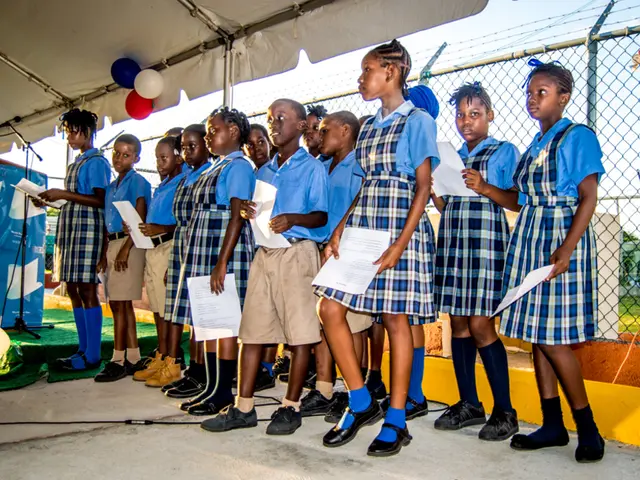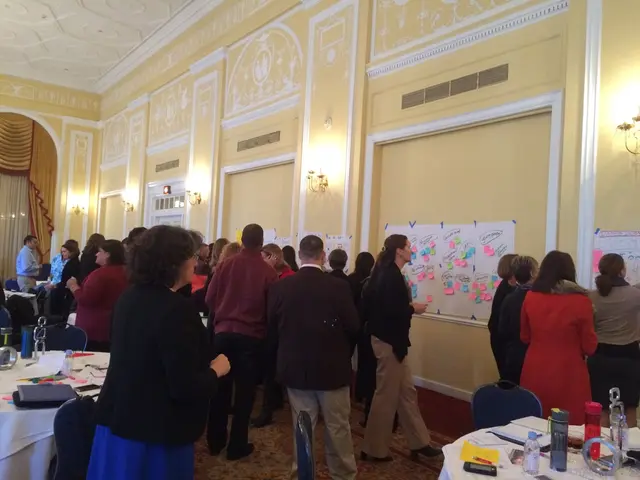Compulsory reading for coronavirus workers: neither Angela Merkel nor Alice Weidel will be featured
The Enquete Commission, a special commission established by the German Bundestag, has focused on a comprehensive analysis and learning from the pandemic to prepare for future health crises. The commission's main areas of focus include the impact of the pandemic on healthcare, education, the welfare state, families, children, and young adults, as well as the challenges faced by self-employed individuals, employees, employers, and the cultural sector [1][2].
The commission, composed of 14 MPs and 14 experts, is not designed as an investigative committee with powers such as witness interrogations or access to official documents, but rather as a body dedicated to a comprehensive and scientifically-based analysis and discussion [2][3]. The commission aims to investigate how protective measures were implemented and the societal consequences that ensued, such as the profound disruptions to daily life and the burdens placed on children and young people due to school closures and leisure restrictions [2].
The decision to establish an Enquete Commission rather than an investigative committee is politically contentious. The Alternative for Germany (AfD) advocated for an investigative committee with the power to investigate potential errors or wrongdoings during the pandemic. However, the majority factions of CDU/CSU, SPD, Greens, and Left prefer a dialogue-oriented approach with expert input and societal engagement [1][2][3].
Key Points of the Enquete Commission "Analysis of the Corona Pandemic": - Analysis of pandemic-related challenges for the state, society, economy, healthcare system, and culture [1]. - Investigation of political protective measures and their implementation [2]. - Evaluation of the effects on education, social structures, and family life [1][2]. - Development of recommendations and lessons for future health crises and pandemics [1]. - Composition of members without the special powers of an investigative committee [2][3].
The Enquete Commission serves primarily for a critical, broad-based analysis with a focus on societal, political, and health policy aspects, rather than for the legal prosecution of potential mistakes [1][2][3].
Angela Merkel is said to have acted correctly based on the available knowledge at the time, according to Nida-Rümelin and Schmidt-Chanasit. However, during the pandemic, expertise from developmental psychology and pedagogy was lacking. Furthermore, crucial meetings during the pandemic lacked protocols or minutes, which is particularly problematic [4].
Researchers have warned that AI could pose a threat to humanity by 2030, with the potential for creating bioweapons. The German Bundestag and the commission have been advised to ensure a proper relationship between politics and science, based on the principles of reflective scientific policy advice [5].
The commission will begin its work in September and is due to submit a report with recommendations for handling potential "future pandemic events" by the end of June 2027 [6]. The current state of research is better, and key actors are no longer in office, according to Nida-Rümelin and Schmidt-Chanasit. The authors advise the commission members not to be guided by Angela Merkel or Alice Weidel [7].
The judicial oversight of pandemic measures has repeatedly reached its limits, relying almost exclusively on the expertise of the Robert Koch Institute and the Paul Ehrlich Institute. The judiciary is obligated to create its own expertise in complex fundamental rights infringements, rather than uncritically trusting government agencies [8]. The feasibility of this warning is currently under debate.
References: [1] https://www.bundestag.de/dokumente/textarchiv/2021/kw16/130-21-ge16-0001-0001-0001.php [2] https://www.tagesspiegel.de/politik/corona-enquete-kommission-und-die-debatten-um-die-kosten-des-berliner-museums-moderne/27236500.html [3] https://www.zeit.de/politik/deutschland/2021-06/corona-enquete-kommission-bundestag-pandemie [4] https://www.zeit.de/politik/deutschland/2021-06/corona-enquete-kommission-bundestag-pandemie [5] https://www.tagesspiegel.de/politik/corona-enquete-kommission-und-die-debatten-um-die-kosten-des-berliner-museums-moderne/27236500.html [6] https://www.zeit.de/politik/deutschland/2021-06/corona-enquete-kommission-bundestag-pandemie [7] https://www.tagesspiegel.de/politik/corona-enquete-kommission-und-die-debatten-um-die-kosten-des-berliner-museums-moderne/27236500.html [8] https://www.zeit.de/politik/deutschland/2021-06/corona-enquete-kommission-bundestag-pandemie
- The Enquete Commission is focusing on a comprehensive analysis of the pandemic to prepare for future health crises, covering areas like healthcare, education, the welfare state, and more.
- The commission aims to investigate how protective measures were implemented and the societal consequences that ensued, such as disruptions to daily life and burdens placed on children and young people.
- The commission is not designed as an investigative committee, instead, it serves for a critical, broad-based analysis with a focus on societal, political, and health policy aspects.
- Angela Merkel's actions during the pandemic are said to have been correct based on the available knowledge at the time, but expertise from developmental psychology and pedagogy was lacking.
- Researchers have warned that AI could pose a threat to humanity by 2030 and have advised the Bundestag and the commission to ensure a proper relationship between politics and science.
- The commission will begin its work in September and is due to submit a report with recommendations for handling potential "future pandemic events" by the end of June 2027.
- The current state of research is better, and key actors are no longer in office, according to Nida-Rümelin and Schmidt-Chanasit.
- The authors advise the commission members not to be guided by Angela Merkel or Alice Weidel.
- The judicial oversight of pandemic measures has repeatedly reached its limits, relying almost exclusively on the expertise of the Robert Koch Institute and the Paul Ehrlich Institute.
- The judiciary is obligated to create its own expertise in complex fundamental rights infringements, rather than uncritically trusting government agencies.
- The commission's main areas of focus include the impact of the pandemic on healthcare, education, the welfare state, families, children, and young adults.
- The commission also focuses on challenges faced by self-employed individuals, employees, employers, and the cultural sector.
- The commission is tasked with developing recommendations and lessons for future health crises and pandemics.
- The AfD party advocated for an investigative committee with the power to investigate potential errors or wrongdoings during the pandemic, but the majority factions opposed this.
- The commission is composed of 14 MPs and 14 experts, and it is not designed with the special powers of an investigative committee.
- Critical, broad-based analysis is the focus of the Enquete Commission, rather than for the legal prosecution of potential mistakes.
- The decision to establish an Enquete Commission rather than an investigative committee is politically contentious.
- Expert input and societal engagement are preferred by the majority factions of CDU/CSU, SPD, Greens, and Left.
- Intertwining of politics and science is a concern, as experts have warned that AI could create bioweapons by 2030.
- The Enquete Commission serves as a platform for educational and self-development opportunities, encouraging personal growth and policy-making based on critical thinking and evidence-based insights.






